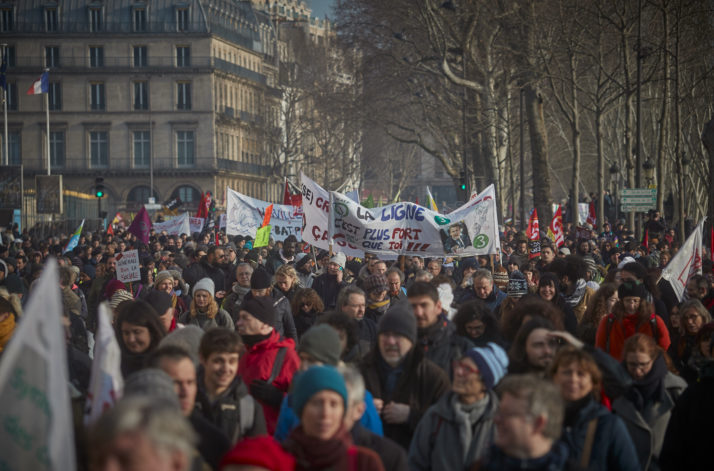John Lichfield is a former foreign editor of the Independent and was the newspaper’s Paris correspondent for 20 years.
PARIS — More than 50 days of protest, a modern record, have failed to destroy Emmanuel Macron’s radical reform of the chaotic French state pensions’ system.
Crippling strikes, mostly on the railways and the Paris Metro, have melted away. The French president has won a conventional, set-piece trial of strength with militant unions that previous presidents have lost.
Details of the reform, approved by the government on Friday, will go to parliament next month and will become law by the end of June.
And yet, the dispute is far from over. The current situation could drag on for months, and it is uncertain whether Macron will gain electorally from persevering with a courageous but poorly explained and widely disliked reform.
The pensions dispute has revealed a degree of animosity and hysteria that surpasses anything I can remember in two decades.
Opposition has shifted into a diffuse and unpredictable new phase of agitprop, torchlit marches and hit-and-run actions, ranging from the amusing to the disruptive and violent.
On the plane home from the Auschwitz commemoration in Israel last week, Macron accused unnamed opposition figures of encouraging political violence by making “seditious” claims that his government is a dictatorship, not a democracy.
“Go and try a real dictatorship,” he said. “Then you’ll see.”
He has a point. Two ministers in Macron’s government have received death threats. The headquarters of the broadly pro-reform moderate trade union federation, the CFDT, has twice been invaded by flash-mobs.
Macron-supporting parliamentarians have had their constituency offices vandalized. A molotov cocktail was thrown through the terrace window of a celebrated Paris brasserie where Macron celebrated his first-round victory in 2017.

The stubborn resistance to pension reform extends beyond the anti-capitalist left and populist far right | Kiran Ridley/Getty Images
The pensions dispute has revealed a degree of animosity and hysteria that surpasses anything I can remember in two decades as a reporter in France. The Yellow Jacket movement may have faded, but its visceral anti-Macronism is as strong as ever.
French social media swarms with poisonous hatred for “the fascist dictatorial regime of the illegitimate banker Macron,” to quote just one example.
More worryingly for the Macron camp, the stubborn resistance to pension reform extends beyond the anti-capitalist left and populist far right.
Lawyers, ballet dancers, musicians, teachers, senior civil servants — the kind of tolerant, middle-of-the-road people who Macron needs to win another term in 2022 — remain determined to cling on to their occupational pension regimes. Suspicion of the new universal system remains deep and broad.
In an Elabe poll published Friday, 61 percent of those questioned said they wanted the reform scrapped (although 56 percent also thought the protests should end). Another poll by IFOP found that 45 percent of French people thought of themselves as “in revolt” against the “economic and social” conditions in France.
Wrestling the sea monster
„In revolt?“ Has no one told them that unemployment is falling sharply? That foreign investment and domestic business start-ups are running at record levels?
On both the economy and pensions reform, Macron and his prime minister, Édouard Philippe, have success stories to tell. They have failed to tell them.
On pensions, Philippe has at least tried. Macron has been strangely absent.
By pushing ahead with the reform, Macron showed huge political courage — or, some would say, foolhardiness. Then he disappeared. He stirred up a dormant sea monster and then left it to his government to wrestle with it.
There was no pressing need for another reform of France’s 42 state pension systems. There was no obvious political gain — and many perils — in radical changes that will not prove their worth until 2037 (four presidential elections away).
Under the new rules, the official retirement age of 62 will remain but the age to qualify for a full pension will be extended to circa 65 by 2037.
Macron and his government underestimated the complexity of their task. How can you build a universal but fair pensions system from such a jumble of different schemes? Lawyers currently pay half the contributions of doctors. Rail-drivers can retire at 52 on more than double the average pension.
The reform bill that has emerged after two years of consultations and eight weeks of protests is confusing and moth-eaten. It spares everyone over the age of 45. Exceptions have been granted, which undermine the system’s claim to be universal.
But there are also many important advances. The new system will be fairer and more re-distributive — more “left-wing” — than the bizarre tangle of regimes that it will replace.
It will phase out, over two decades, the taxpayer-subsidized, gold-plated early retirement long enjoyed by rail, Metro and some other state employees. It will increase pensions for farmers, working mothers and the self-employed, who are treated unfairly by the present archipelago of systems.
It will create a €1,000-a-month minimum pension that will increase with wages. It will create a solid financial base on which France’s all-public pensions model can survive as life expectancy increases.

Unconventional protests and short, targeted strikes will go on for weeks | Kiran Ridley/Getty Images
Most importantly of all, the reform will encourage, or chivvy, the French — who work fewer hours on average than any other Western country — into working as long as their European neighbors and thereby lift the permanent brake it has put on its economic performance.
Under the new rules, the official retirement age of 62 will remain but the age to qualify for a full pension will be extended to circa 65 by 2037. If you decide to work longer, your pension will be higher; if you retire at 62 it will be lower.
A sprawling 1,000-page government analysis of the system published, belatedly, last week set out some of these advantages. It was immediately mined by opponents for anomalies and hidden pitfalls.
Unconventional protests and short, targeted strikes will go on for weeks, at least until the law is passed in June. They may go on for the two remaining years of Macron’s mandate.
France’s bad mood
This new form of social movement — the chronic-but-not-crippling protest without end pioneered by the Yellow Jackets — is partly a symptom of our angry and polarized times. But there is also something Macron-specific about the intensity and longevity of France’s bad mood.
People close to Macron said that he is convinced that pensions reform will help him in 2022.
The country that invented left and right as political labels has not digested its somewhat-accidental election of a young, centrist president. The right resents him. The left misrepresents him.
The president and his LREM party have failed to build a grassroots base of their own in the last 30 months — a failure that will be punished in the municipal elections in March.
Has Macron made a huge electoral mistake? Some supporters insist that he does not make vulgar calculations of that kind. He believes he has a mission to change France for its own good, whether France wants to be changed or not. He is a true revolutionary, they say — unlike the “pro-status-quo revolutionaries” of the left who call for change but reject all changes.
Others close to Macron say that, au contraire, he is convinced that pensions reform will help him in 2022. Defeating the militant unions will please his increasingly conservative and elderly “base.”
That will consolidate the 25 percent to 30 percent of support he needs to make the two-candidate run-off. He will then comfortably defeat Marine Le Pen in the second round.

If the protests against Macron drag on and his poll ratings collapse, he could face serious opposition in 2022 | Ludovic Marin/AFP via Getty Images
There is, however, a flaw in this calculation.
If the protests against Macron drag on and his poll ratings collapse, he could face serious center-right and maybe center-left opposition in 2022.
His ratings have eroded a little but remain more or less stable in most polls at around 30 percent. If they collapse into the mid to low 20s, as they did in 2018, the first round of the next presidential election would become a three-, or four-way, lottery and Macron might not even reach the sanctuary of a second-round contest against Le Pen.
France’s bad mood did not begin with Macron. Although he rewrote the rules of presidential politics three years ago, he is not immune to his country’s fickle, political history — one that has seen every president for the last 46 years rejected by the French electorate at the first opportunity.
Source: politico.com
See more here: news365.stream






